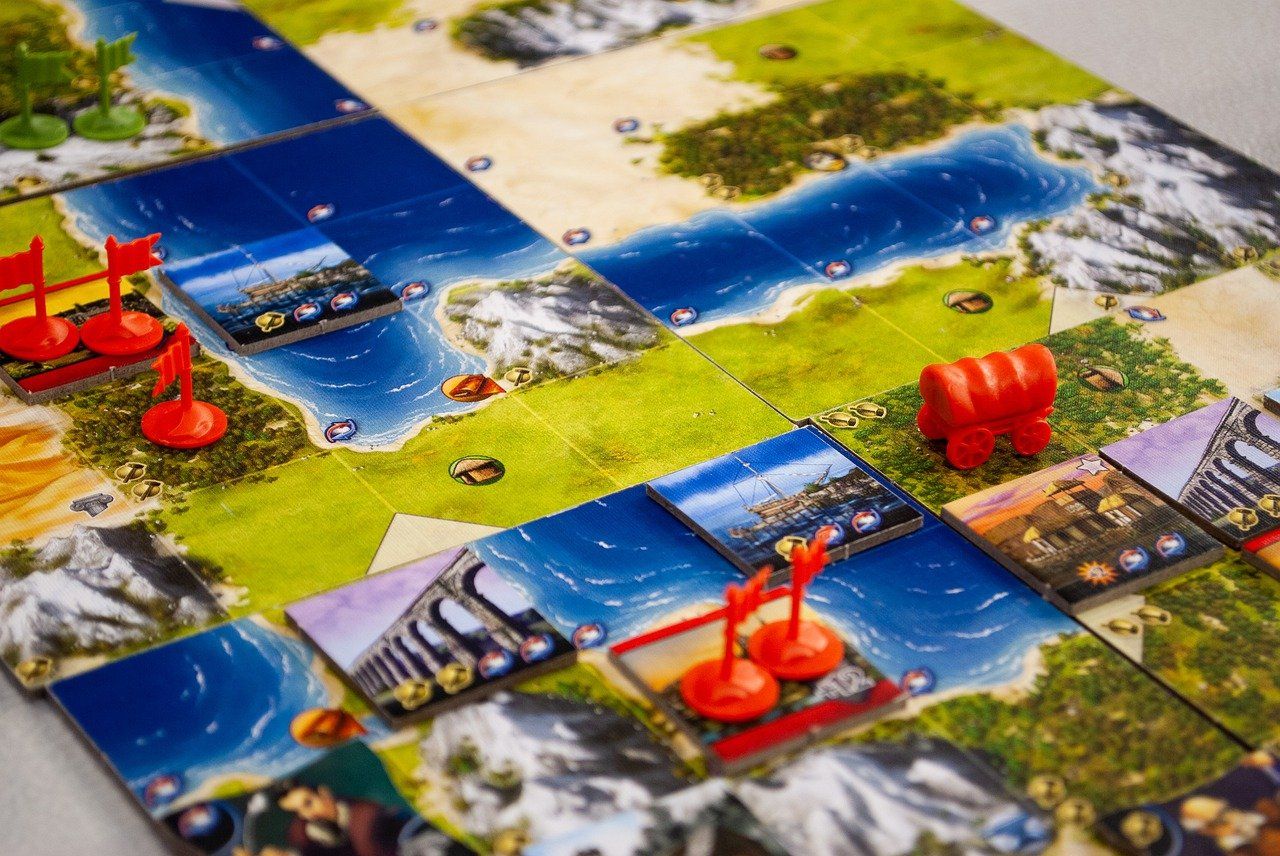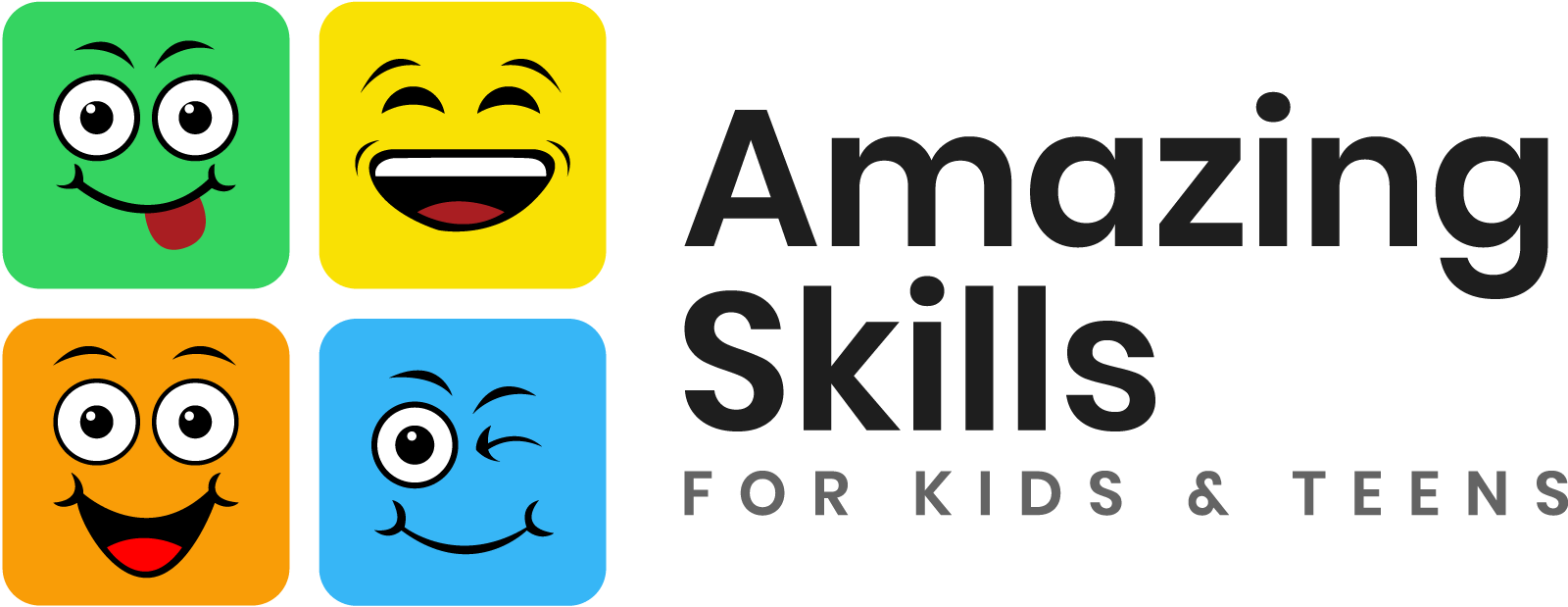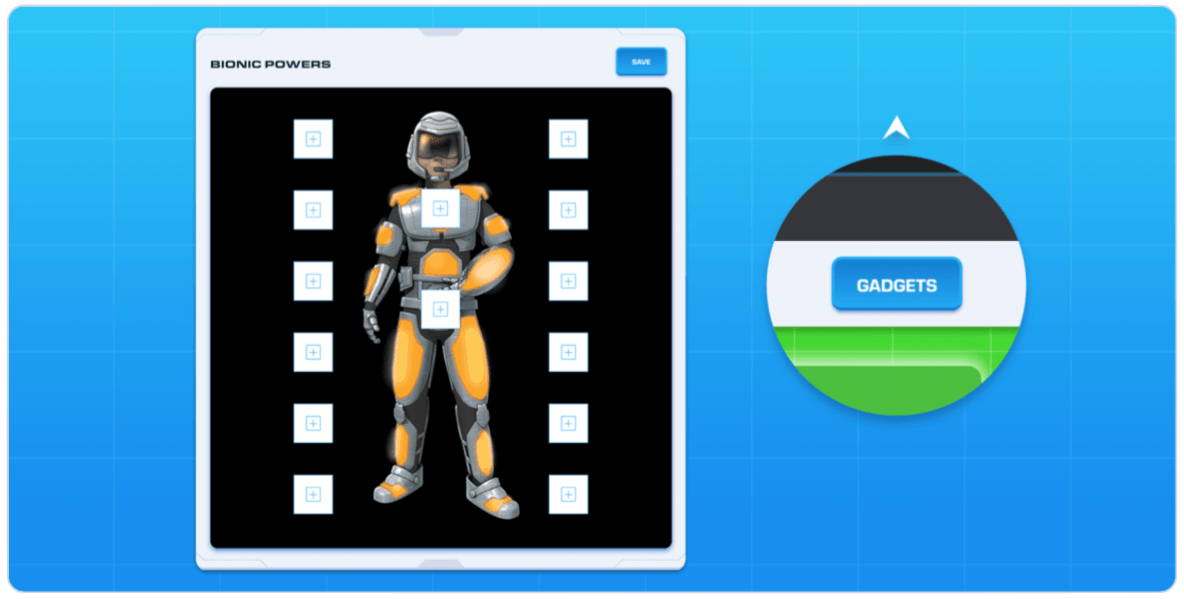Secret Agent Society
Autism Social Skills Adventure - Ages 7-12 y.o.
Your child can learn friendship skills & emotional regulation skills.
Video Review: The EXACT Skills Your Child Learns...
What Children Learn in Secret Agent Society:
Session 1 - Learning To Read People
Session 2 - Exploring Happiness, Anger & Anxiety
Session 3 - Strategies For Tough Days
Session 4 - Friendships + De-Escalating
Session 5 - Decisions + Negotiation Skills
Session 6 - Join & Play In With Others
Session 7 - Friendship Repair Skills
Session 8 - Handling Bullying
Session 9 - Handling Change & Surprises
Session 10 – Putting Skills Together For Confidence
Session 11 -
Using Skills For The Future
Session 1 - Learning TO READ PEOPLE
Skills That We Explore Together:
- Reading people’s emotions based on facial expressions and other body language.
- Reading people’s emotions based on the tone, pace, pitch and volume of their voices.
- Basic conversational skills to keep conversations going for more than a few sentences, focusing on finding shared interests and asking open-ended questions (such as why/how/etc)
Secret Agent Missions:
- Priority 1: Log in to playsas.net and play the ‘training simulations’ (aka practise games) to reinforce the skills we covered in our session.
- Priority 2: So much of what we did this week was all about reading other people’s emotions from their facial expressions and their tone of voice. A great way to reinforce this would be to watch something on a DVD/Youtube/Netflix where you can pause the show and rewatch little sections. The focus here is to be asking, ‘What is the character thinking/feeling’ and to base that judgement/detective work on that person’s facial expressions and their tone of voice.
Session 2 - EXPLORING HAPPINESS, ANGER & ANXIETY
Skills That We Explore Together:
- The different ways that our body responds to these emotions:
- Happiness
- Anger
- Anxiety
- The different degrees of emotion for those 3 emotions (e.g. Happiness: mild happiness vs happiness vs delight vs over-the-moon levels of happiness)
- Different tools we can use for helping our bodies de-escalate (calm down) when we are starting to get into a heightened state and starting to let our emotions rule us.
Optional Secret Agent Missions:
- When you are watching movies, please pause the movie and ask your child what emotion the character is feeling, and how you would rate that emotion on a scale of 1 to 10 (using their ‘emotionometer’). The goal is to help your child recognise the difference between mild levels of emotion and really strong emotion.
- Your child has some secret agent missions to do on the computer software that will help to lock the skills into your child’s memory.
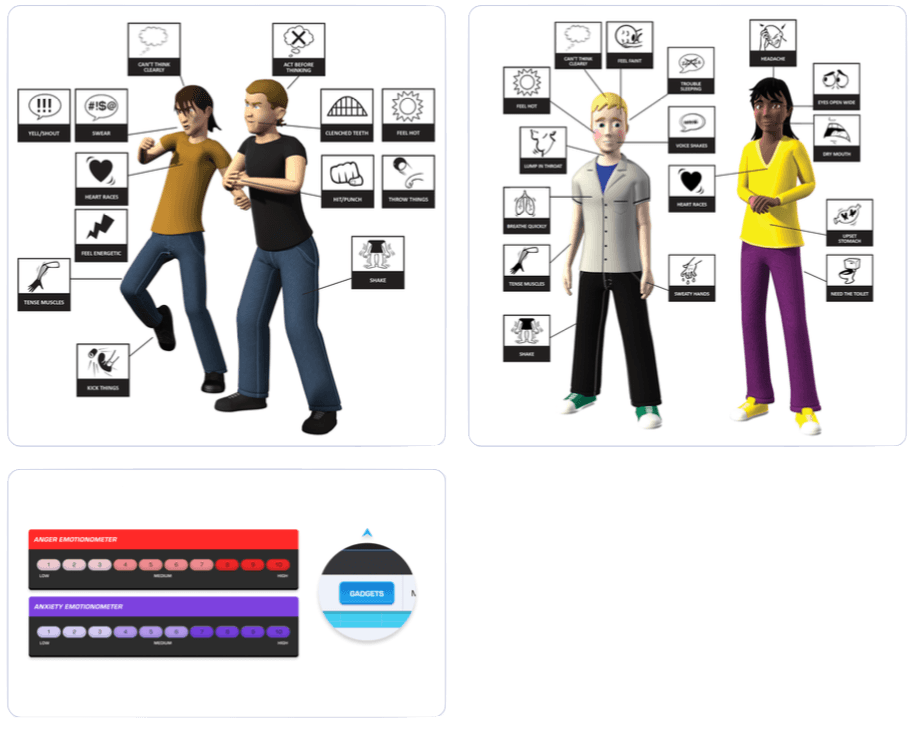
Session 3 - strategies for tough days
The fire engine:
We learnt about the fire engine which is a secret agent symbol that your child uses when they need to get out of an anxious or angry situation - it is the last line of defence before our child has a meltdown. Please have a look through your child's notes and discuss your child's secret agent symbol and help your child to come up with a way of using that symbol when they are with you and starting to feel overwhelmed. Feel free to prompt your child to use that symbol when you can see them starting to escalate.
The helpful thought zapper:
This is where your child needs to choose what thoughts they will dwell on and reject the thoughts that are not helpful. E.g. it is good to dwell on "I made a mistake and I will try again next time" instead of "I'm so stupid - I can't do anything right". Please have a chat with your child about this skill and ways that you as a parent use this skill in ways that they can use it.
Secret agent missions:
For other secret agent missions at home, I'd recommend continuing to do more work using videos/youtube that is about looking at characters in movies and trying to work out what emotions they are feeling and considering what strategies they could use to be happier.
Session 4 - friendships + de-escalating
SKILL #1: Friendship skills:
How do we choose a good friend? We want to choose people who have similar interests to us, who are consistently kind and friendly and who are going to be fun for us to hang around with in the medium or long-term.
Please support this at home by having conversations at the dinner table a couple of times this week about what you look for in friends (as an adult) and how you know the difference between a great potential friend versus someone who may not going to be a likely candidate. Our children need to see that we think these factors through ourselves and that it is normal to be assessing friendships before diving into them.
SKILL #2: Calming ourselves by focusing on our environment and surroundings:
When we are starting to get emotionally heightened and getting close to having a meltdown, we can bring ourselves back to feeling more calm by shifting what we are thinking about from whatever the issue is that is upsetting us on to what our surroundings are.
So we can look, listen and feel around the room we are in and find something that looks/feels happy or calming and just focus on that. It could be looking out the window, listening to the air-conditioning, or just feeling something like the desk surface or the surface of a book that we are holding. This is a great ‘portable’ skill and if your child will practice this skill then they will have another great tool to use.
Please support this skill at home by having each member of your family practice using this skill just for fun at least once each day. You’ll be surprised at how it works for everyone, not just your child.
Session 5 - decisions + NEGOTIATION SKILLS
SKILL #1: Decision-Making: Deciding on how to solve problems we face by thinking through the consequences/likely outcomes first.
When our kids are starting to get emotionally heightened, our children can’t really think through consequences and that’s how we end up with meltdowns etc. So it’s important to have conversations about how to think through consequences (both good and bad outcomes) while our children are in a calm state, such as at the dinner table. We don’t want this to be only around our child’s choices, but around everybody’s life choices.
Please support this skill at home by showing your child how you use those same skills and help them see examples of this in your life: For example when you drive to work, how do you choose what time to leave home? When you choose to go to McDonald’s instead of cooking a home meal, what factors do you consider.
SKILL #2: Negotiation Skills: creating new solutions that everyone can agree on.
This is really challenging content, but it is such a powerful social skill for your child to learn. When one person wants to choose “Option A” and someone else wants to choose “Option B”, then together we need to create a new option that we can all be happy with - an “Option C”. We didn’t use that terminology, but as parents, you understand what I mean.
Please support this at home by creating scenarios like this and chatting them through at the dinner table. For example, “What TV show should we watch tonight? We need to explicitly teach these negotiation skills because our children were not born with these skills and they need us to demonstrate them and to be patient with them while they try out (and gradually improve in) these sorts of skills.
SKILL #3: Conversational skills - Listening skills:
We practised having conversation skills where we focused on active listening, appreciating other people’s perspectives and validating what they are saying. For example, if someone says, “I don’t like being in lockdown because I would rather see my friends at school”, then it is a skill to say something along the lines of “That sounds really tough. I hope you can get back to school soon.”
To support this at home, please create situations where you can demonstrate this skill and you can ask your child “What would be a good thing for me to say next if someone said [example]?”
Session 6 - JOIN & PLAY IN WITH OTHERS
SKILL #1: How to join in to a group or a game that others are playing
When our kids walk around feeling lonely, it’s often because they don’t know how to go and initiate entry into a social group or a game that is already being played. We looked at many different ways of going and joining a peer group or joining in a game.
Please support this skill at home by chatting with your child about times when you have felt left out of groups when you were their age. Also chat about times when you have been able to join other people by being brave, being deliberately friendly, and going and joining in and being willing to play according to other people’s rules.
SKILL #2: How to play well with others - so they want you to join again
We looked at many skills and techniques here. We covered things like:
- Letting others have their turn first
- Allowing others to say “Yes” or “No” to us
- Avoiding being clingy or needy
- Coming up with a backup plan if we are excluded from groups (e.g. go to the library)
- Avoiding being the rules-police
- Saying goodbye in a friendly manner, even if we don’t feel like the game has been fun.
Please support this at home by chatting through different scenarios and what our child’s options were that happened to our child each day at school.
SKILL #3: Conversational skills - Talking about other people’s interests.
We have been continuing to work on our conversational skills. This week, we focused on chatting with others about topics that are interesting for the other person, rather than just focusing on our own interests.
You can support this at home by role-playing both sorts of conversations at the dinner table or while you are driving in the car with your child.
Session 7 - FRIENDSHIP REPAIR SKILLS
SKILL #1: When and how to use “sorry”
Everybody makes mistakes. How do we say sorry and repair relationships when we make mistakes? The group looked at how your child can fix things after we have hurt someone’s feelings. We discussed options for who we can go to for help when we don’t know how to solve relationship problems. We discussed a variety of ways that we can use our words well to say sorry.
FUN PRACTISE GAMES: You can support this skill at home by having family members practice using this skill just for fun at least once each day In humorous and crazy made-up scenarios. For example, We can role-play what Luke Skywalker could say to Yoda if he borrows his spaceship and accidentally crashes it. We can role-play what a young hobbit would say if he insulted Gandalf by telling him that he is old and ugly. You’ll be surprised at how it works for everyone, not just your child.
SKILL #2: Playful joking vs actually teasing vs genuine accidents - how to respond
We looked at how to work out the difference and how we can respond. This is really challenging for children. However, there are clues we can look for. For example, if we don’t like what happened and we tell our friend “I didn’t like that,” do they respond by looking serious and saying sorry, or do they respond by pushing us further and using a teasing/sarcastic voice?
HAVE A CHAT: Please support this at home by having conversations at the dinner table or in the car about different scenarios and different ways to respond. Our children need to see that We may not know for sure what someone else’s motives are, but we can tell from the responses whether they are concerned for us or not.
SKILL #3: Conversational skills:
We practised our conversational skills more and we tried out some new conversations to build up our skills in how to chat in a group..
PRACTISING: To support this at home, it would be great if you could give your child a chance to practice staying on topic on a group-conversation at the dinner table or somewhere else with others a few times this week.
Session 8 - HANDLING BULLYING
This week’s session was so important because knowing how to deal with teasing and bullying has a very positive effect on your child’s enjoyment of school. Even at times when your child is at school and not being teased or bullied, if they are living with a fear of being teased or carrying a sense of concern about it, that creates unhelpful anxiety. So the purpose of this week’s content is about more than giving your child strategies for how to deal with bullying. Instead, it’s also about helping your child feel confident that in the inevitable times that other people will be unkind to us, that is okay because we already have strategies and a plan to deal with that.
SKILL #1: How to recognise teasing & bullying, whether it is obvious or more subtle.
We helped your child understand that there are good strategies they can apply for the 3 main types of teasing & bullying.
- Physical bullying
- Name-calling/putdowns/teasing
- Intentionally excluding/leaving people out/turning others against people
Please support this skill at home by chatting with your child about times when you needed to deal with each of those different styles of hassling/ bullying when you were their age. Emphasise the different strategies you used for different types of bullying. Your child needs to understand that just like you were able to overcome what you dealt with, they will also have skills and tools and they will know how to handle other people in these situations.
SKILL #2: Understand what motivates bullying/teasing & how to respond so that the bully doesn't get what they wanted
Teasing and bullying occurs to achieve a social goal for the benefit of the bully. We looked at 8 different motivations for bullies, and how to not give the response they are looking for. This reduces the chances that we will become targets again in the future. We looked at preventative things such as deliberately choosing to stay with friends rather than allowing ourselves to be isolated. We also looked at what steps to take such as how to use a confident face and a confident voice and how to calmly pull out of a confrontation before it escalates.
Please support this at home by watching Youtube videos or TV shows where kids are encountering low-level teasing or bullying. Examine the strategies that characters used to respond to teasing/bullying. If the goal is to withdraw calmly from a teasing/ bullying situation, did the characters succeed at that or were there better strategies they could have used?
SKILL #3: Bully-guard body armour
We can feel confident when we are wearing our armour. That includes having a ‘brave face mask’ and a ‘confident body suit’. Our ‘cruel comments deflector shield’ reminds us that we don't have to let other people's words impact us because their words can just bounce off us. The goal is to equip your child with strategies that they can use consistently that will work in most situations.
You can support this at home in conversations by emphasising that we don't have to do respond in a hurt or angry way, but instead can choose strategies that reduce the chances we will be chosen as a target next time. Words can't actually hurt us unless we allow them to. We can show others that their bullying won't work and we can feel confident that we have the secret agent skills to handle future teasing/bullying.
Session 9 - HANDLING CHANGE & SURPRISES
Helping your child learn how to dealing with unexpected events/change to routines:
This week, we covered a very important skill. It is the skill of knowing how to handle when things don’t go well for us all when surprises happen or when routines unexpectedly change.
Here’s what makes this skill tricky - to handle sudden changes, we need to use more than one skill:
- First, we use our secret agent skills to stay calm (e.g. use the oxygen regulator/deep breathing or other techniques.
- Second, we tell ourselves that things will be okay and that we can handle this change. (e.g. use the “Unhelpful Thought Zapper” to shoot out the unhelpful thought of “This is terrible” and replace it with more helpful thoughts like “This is tricky, but I can stay calm.”
- Third, we are then brave and ready to face the sudden changes/unexpected events.
Computer Games (Secret Agent Missions)
Ideally, by this point in the course, the majority of your child’s computer games would be complete. It’s okay if your child is not yet at that point because usually most children who fall behind can catch up quickly with some reminders from parents.
Tip: set your phone alarm to go off when it is practise time each day.
Stay in touch between now and your child’s next session. Like a fairy godmother, I’m only an email away.
Important: 2-3 month break for your child's Secret Agent Society
Your child now has a 2-3 month break from their regular sessions. Your child is ready to go out into the world using their secret agent skills. We'll get back in touch with you about a fortnight before your child's next session to give you options to book in a time convenient for your child.
Timeline:
Student Session 9 - that is this week.
Parent Session #4 - depending on when you booked, either this week or next week.
[2-3 month break]
Student Session 10 - sometime June/July
[2-3 month break]
Student Session 10 - sometime Sept/Oct
Session 10 - HANDLING CHANGE & SURPRISES
Ideally, by this point in the course, the majority of your child’s computer games would be complete. It’s okay if your child is not yet at that point because usually most children who fall behind can catch up quickly with some reminders from parents.
Tip: set your phone alarm to go off when it is practise time each day.
Stay in touch between now and your child’s next session. Like a fairy godmother, I’m only an email away.
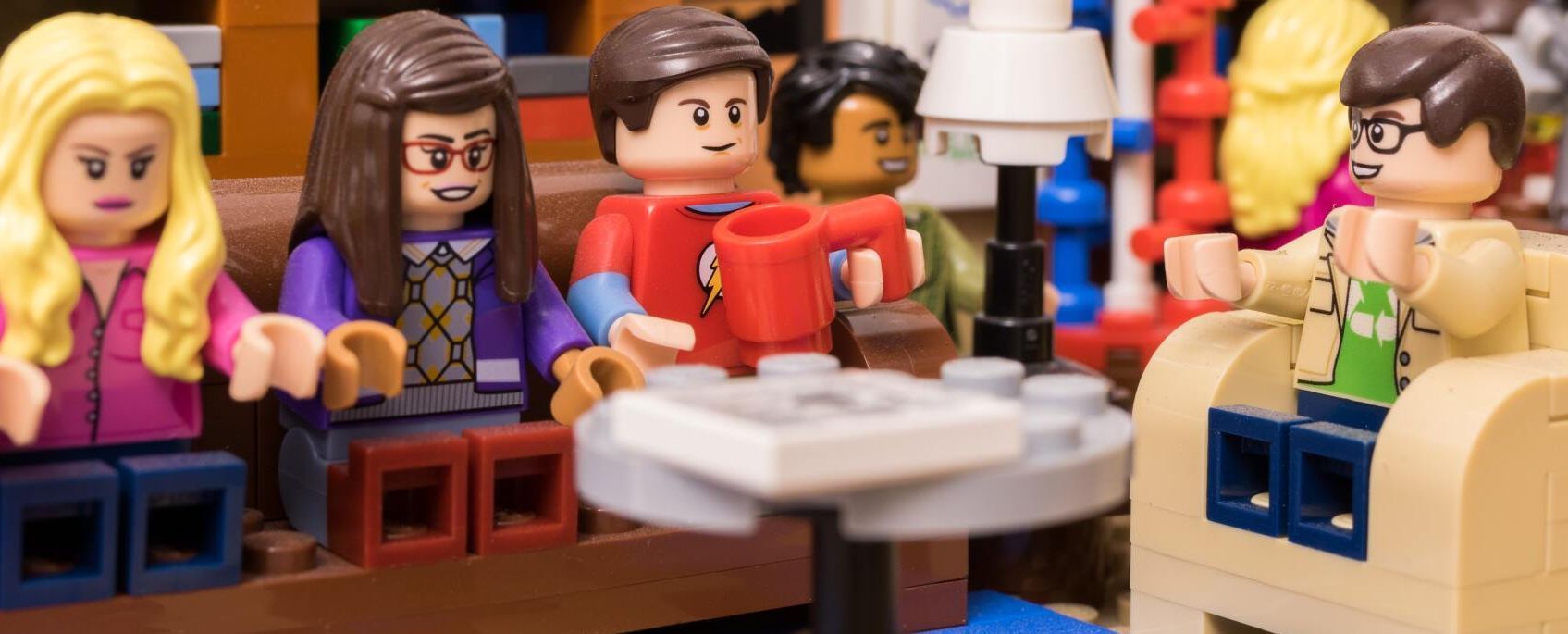
Session 11 - HANDLING CHANGE & SURPRISES
Ideally, by this point in the course, the majority of your child’s computer games would be complete. It’s okay if your child is not yet at that point because usually most children who fall behind can catch up quickly with some reminders from parents.
Tip: set your phone alarm to go off when it is practise time each day.
Stay in touch between now and your child’s next session. Like a fairy godmother, I’m only an email away.
